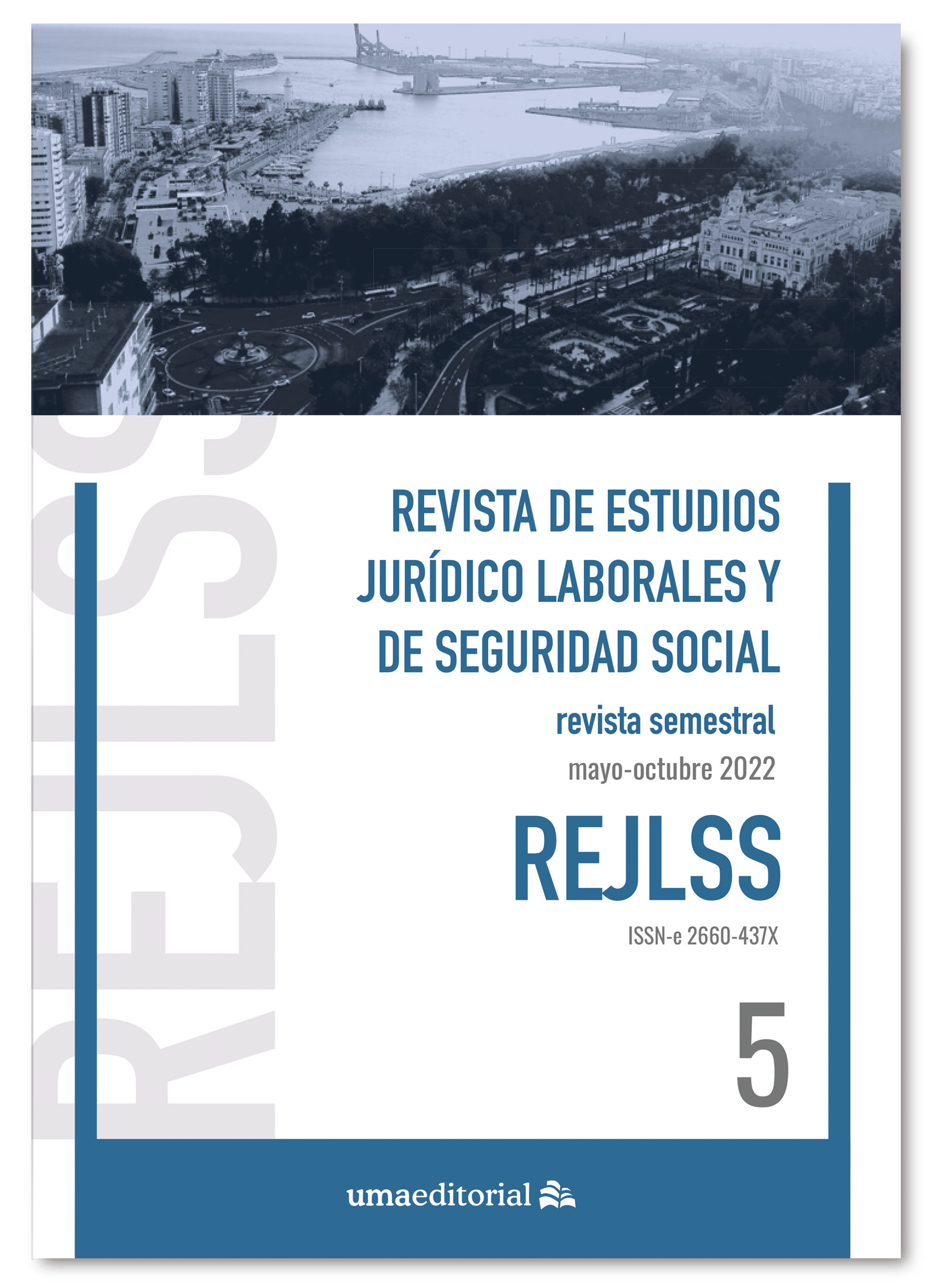Latest court ruling on additional compensation for violation of fundamental rights in null dismissals
DOI:
https://doi.org/10.24310/rejlss.vi5.14704Keywords:
null dismissal, violation of fundamental rights, compensation for injury to fundamental rights, criteria for specifying the financial amount of compensationAbstract
The violation of fundamental rights in null dismissals entails the implementation of additional financial compensation. Two problems arise in its effective practical procedural concretion. In the first place, the way or form in which the compensation action is enforced, requiring, or not, that the claim assesses in detail the criteria and parameters that must be taken into consideration for the valuation of the amount of its amount. In the second place, the doubt arises, given the lack of express regulations to that effect, of what should be the criteria that should be used to operate said quantification. The purpose of the work is to reflect on the evolution of the doctrine of the Supreme Court in this matter.
Downloads
Metrics
Publication Facts
Reviewer profiles N/A
Author statements
Indexed in
-
—
- Academic society
- N/A
- Publisher
- Universidad de Málaga. UMA Editorial
References
García Romero, B., “Indemnización adicional por daño moral derivado de la vulneración de derechos fundamentales en el supuesto en el que, por dicha vulneración, el despido es declarado nulo”, Revista de Jurisprudencia Laboral, núm. 4, 2022.
Maneiro Vázquez, Y., “El derecho a la indemnización por daños morales como consecuencia de la lesión de la libertad sindical a la luz de la Sentencia TC 247/2006, de 24 de julio”, Dereito, vol. 22, 2013.
Monereo Pérez, J. L., “Despido nulo por vulneración derechos fundamentales, resarcimiento del daño moral y modo ‘prudencial’ de cuantificación de la indemnización”, Revista de Jurisprudencia Laboral, núm. 3, 2022.
Pérez de los Cobos Orihuel, F., “Tutela judicial efectiva y determinación de la indemnización por tutela de la libertad sindical”, en VV. AA. (ALonso Olea, M. y Montoya Melgar, A. [Dirs.]), Jurisprudencia Constitucional sobre Trabajo y Seguridad Social 2006 (Tomo: XXIV), Thomson Civitas, Cizur Menor, 2ª ed, 2007.
Sepúlveda Gómez, M., “Incidencia de la Sentencia del Tribunal Constitucional 247/2006, de 24 de julio, en la doctrina sobre la indemnización por conducta antisindical”, Revista de Derecho Social, núm. 35, 2006.
Downloads
Published
How to Cite
Issue
Section
License
In the Revista de Estudios Juridico Laborales y de Seguridad Social (REJLSS) we are clearly committed to a policy of open access to scientific knowledge (See Berlin Declaration).
Those authors who have publications with this journal accept the following terms:
This journal provides immediate free access to its content under the principle of making research freely available to the public. All the contents published in the REJLSS are subject to the Creative Commons license
Attribution-NonCommercial-NoDerivatives 4.0 International (CC BY-NC-ND 4.0)
Copyrights are of two kinds: moral and patrimonial. Moral rights are perpetual, inalienable, non-transferable, inalienable, unattachable and imprescriptible prerogatives. In accordance with Spanish copyright legislation, the authors who publish in REJLSS retain the moral right over their work, as well as the ownership of the patrimonial right, which will be transferred to the University of Malaga for its dissemination in open access.
The patrimonial rights, refer to the benefits that are obtained by the use or disclosure of the works. REJLSS is published in open access and is exclusively authorized to perform or authorize by any means the use, distribution, dissemination, reproduction, adaptation, translation or transformation of the work.
It is the responsibility of the authors to obtain the necessary permissions of the images that are subject to copyright.
Authors whose contributions are accepted for publication in this journal retain the non-exclusive right to use their contributions for academic, research and educational purposes, including self-archiving or depositing in open access repositories of any kind.
The electronic edition of this magazine is edited by the Editorial of the University of Malaga (UmaEditorial), being necessary to cite the origin in any partial or total reproduction.
The authors may adopt other non-exclusive license agreements for the distribution of the version of the published work (eg: deposit it in an institutional telematic archive or publish it in a monographic volume) provided that the initial publication is indicated in this magazine.
Authors are allowed and recommended to disseminate their work through the Internet (eg, in institutional telematic archives or on their website) before and during the submission process, which can produce interesting exchanges and increase citations of the published work.







19.png)
